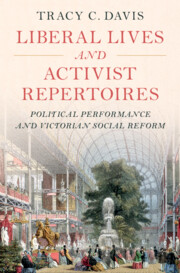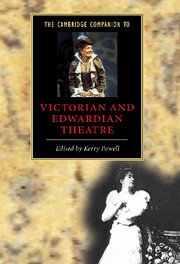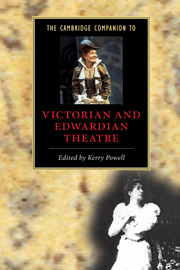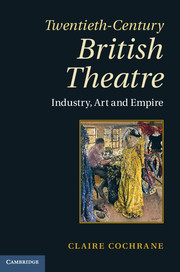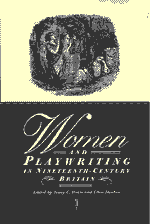Liberal Lives and Activist Repertoires
This ambitious study traces the strategies of human rights activists to show how world-changing reform movements were shaped by women and men from modest backgrounds who were deeply attuned to the power of performance. Tracy C. Davis explores nineteenth-century reform campaigns through the pioneering work of a family of activists – prominent anti-slavery lecturer George Thompson, his daughter Amelia (the first female theatre and music critic for a British daily newspaper) and her husband, the political organizer Frederick Chesson. Engaging in some of the most important social struggles of the late Georgian and Victorian periods – including abolition, enfranchisement, and anti-genocide - this book reveals how two generations' insights into performance consolidated into activist tactics that persist today. Characterised by a skilful deployment of performance theory alongside deep and wide-ranging historical knowledge, this ground-breaking work demonstrates what 'dramaturgy' can teach us about 'history'.
- Offers copious examples of how nineteenth-century reformers utilized dramaturgy to describe, enact, and improve political efficacy
- Takes an interdisciplinary approach and traces strategies of reform campaigns in the first transcontinental movements that are still in use today as the cornerstones of single-issue movements and even social media campaigns
- Follows the fortunes of historically neglected activists in the abolitionist, anti-genocidal, and pro-civil rights movements in Britain, the US, South Asia, and throughout the worldwide sphere of British influence and political liberalism
Reviews & endorsements
‘With her distinctive form of precision historiography, Tracy Davis has given us a vital and necessary addendum to the long history and ongoing project of abolitionism. Focusing primarily on the lives and work of three Victorians, Davis elaborates a theory of performance that situates seemingly minor forms of activism - hosting dinners and attending meetings, letter-writing campaigns, journalistic reportage, and speechifying - as fundamental to the cultivation of solidarity and to the momentum of political engagement. This is a wonderful book: meticulously researched, compellingly argued, and beautifully narrated.' Patrick Anderson, University of California, San Diego
‘How was the work of social and political reform performed? And how did performance change the means and outcomes of that activism? In this remarkable, carefully-wrought book, Tracy Davis turns our attention to the importance of dramaturgy to the work of nineteenth-century reform movements, illuminating how one scholar can find performance in everything from petitioning to letter-writing and parades. A terrific feat of scholarship.' Carolyn Eastman, Virginia Commonwealth University
'In her compelling new study, Tracy Davis challenges preconceptions about how early activists developed and shared their strategies, revealing networks of association and exchange that traversed the globe. This book invites readers to rethink what kinds of performances constitute activism and how historians can recover traces of those spectacles in even the most unlikely places.' Heather Nathans, Tufts University
‘Liberal Lives and Activist Repertoires explores the formation of the modern, liberal society through a broad variety of performative interactions. Political rhetoric, sermons, social conversations, and theatre are the foundation for this, made visible through Frederick Chesson’s meticulously written diaries. Following the traces of women’s and men’s private lives and commitments to form public, political personae, Tracy C. Davis unfolds a broad and colourful panorama of the emergence of activism based in England but with connections to the United States, India under British rule, and a global network. Davis sets a new, inspiring standard in thinking about political performance.’ Peter W. Marx, Institut für Medienkultur und Theater
‘Tracy Davis’ timely and urgent study of the history of liberal campaigning in the Nineteenth Century insists on returning the question of performance to the history of activism. Drawing on the performance frames of mises en scene, repertoire and dramaturgy, Davis’s excellent book reveals the performance tactics that activists deployed to make their case. This is Performance Studies at its best, revealing the theatre as a vital resource for the campaigning tactics underpinning Victorian repertoires of protest and persuasion that are still being used by activists today.’ Aoife Monks, Queen Mary University of London
‘… a compelling, exhaustively researched and nuanced history of Activism as performance repertoire … This thorough study of a familial community’s intervention into liberal politics in Victorian Britain will be of interest to readers from many disciplines, eras and global areas, and is highly recommended for anyone interested in the deepest meanings of reform.’ Jennifer DeVere Brody, Performance Research
Product details
August 2023Hardback
9781009297530
352 pages
237 × 161 × 25 mm
0.68kg
Available
Table of Contents
- Introduction: History as Performance History
- 1. Forms and Increments of Performance
- 2. Change Making: Incrementalism
- 3. Bildung: Leveraging Critique to Propel the Precarious into Political Life
- 4. Combative Pens
- 5. Experiments in Becoming.

